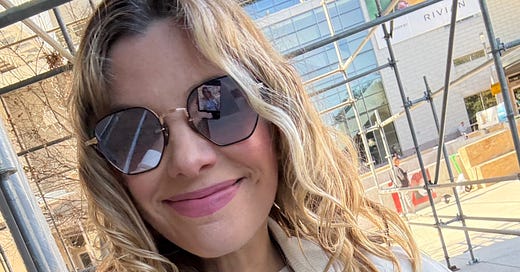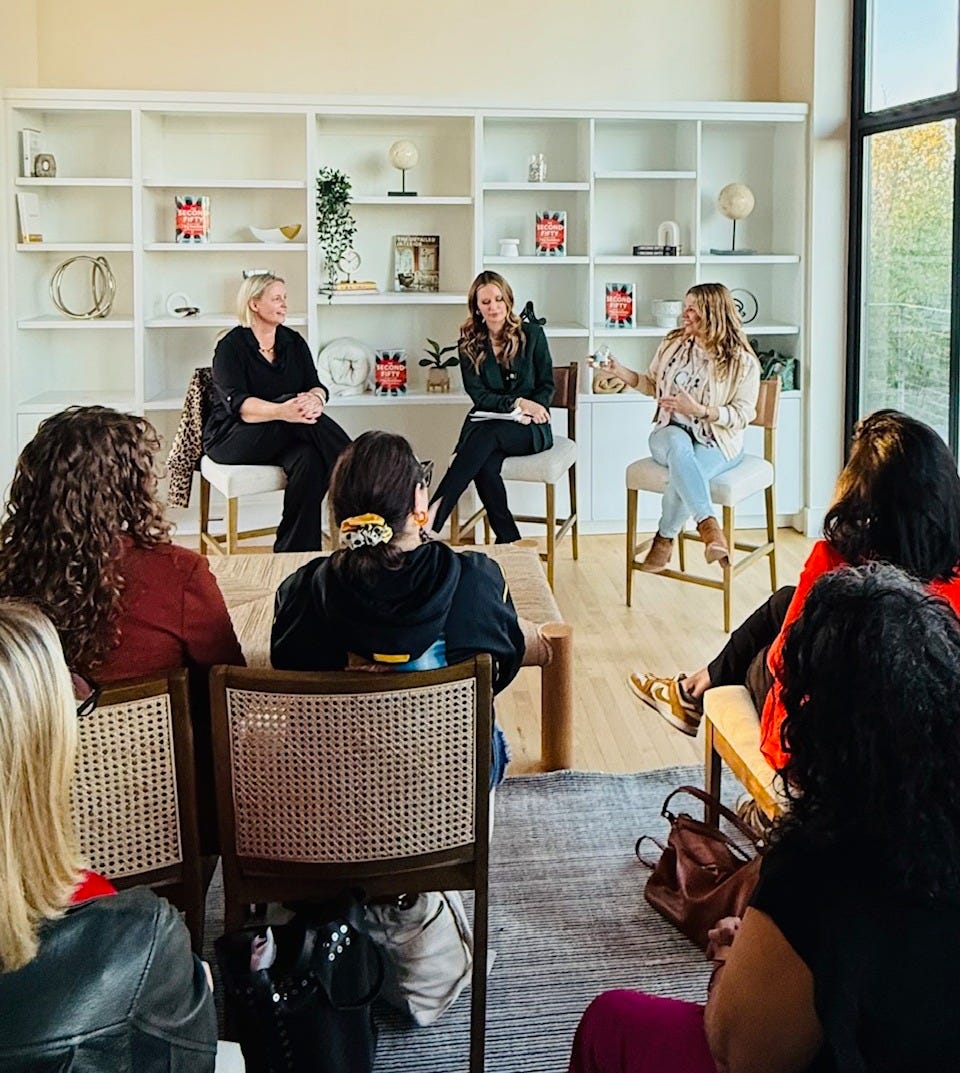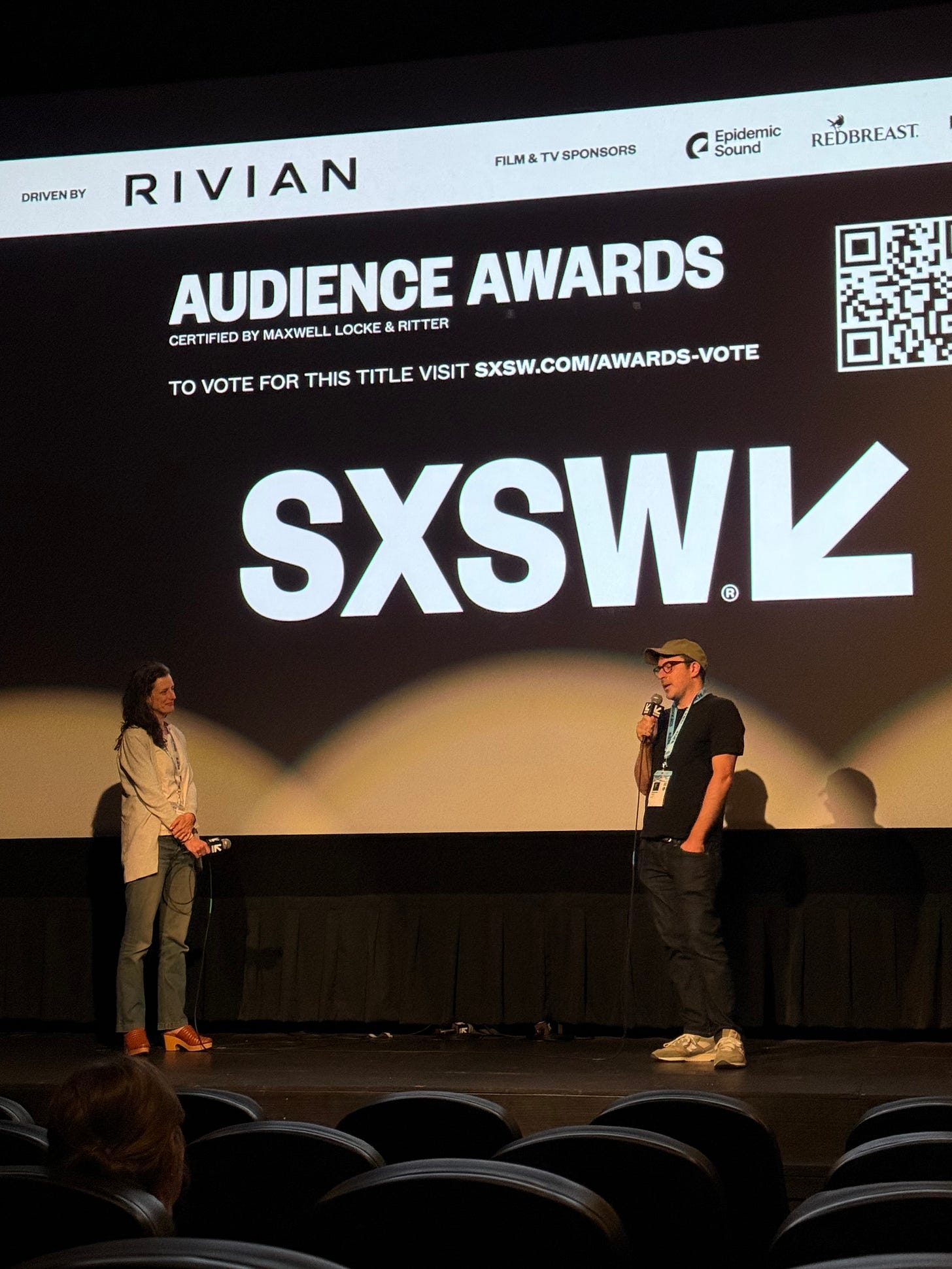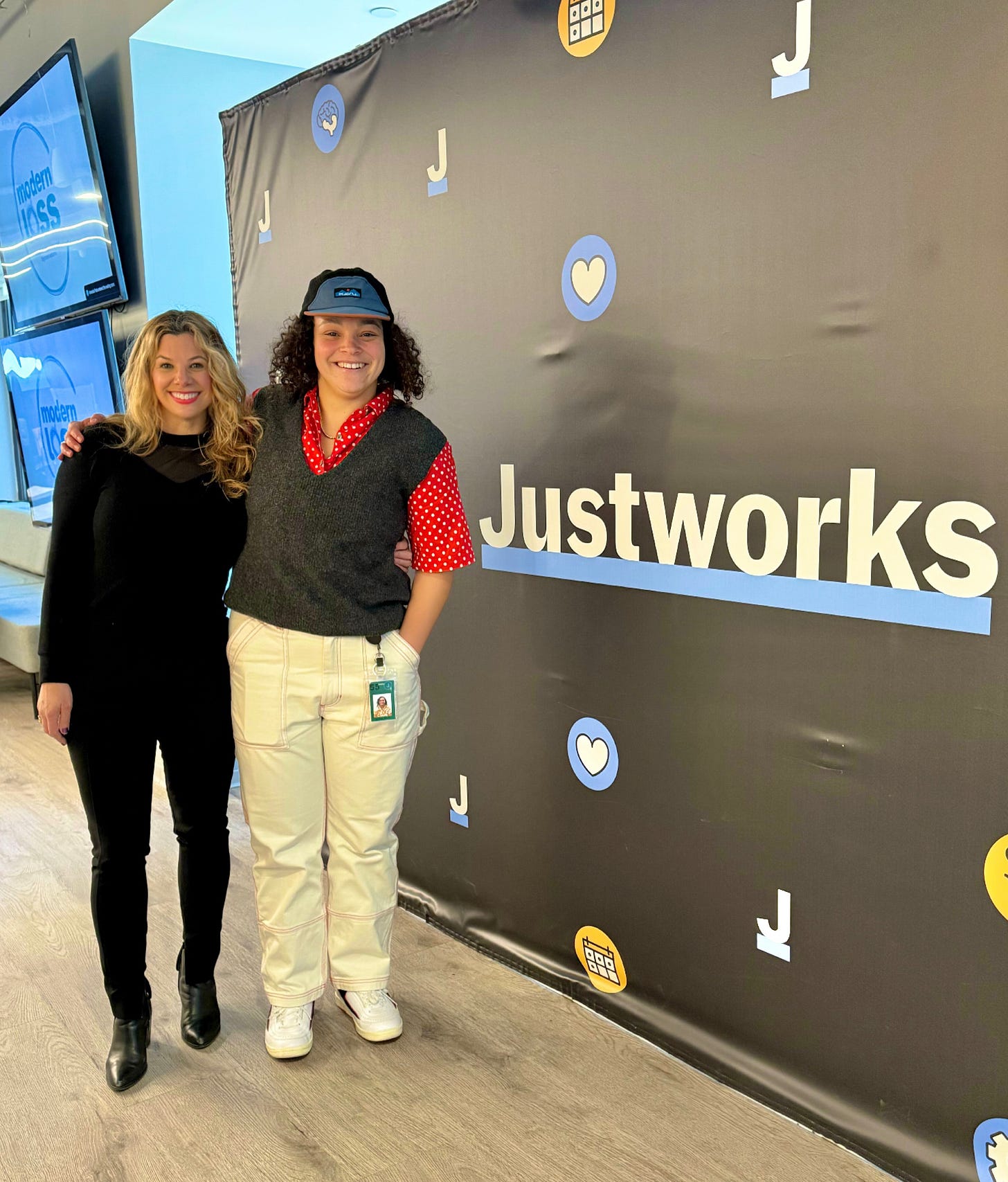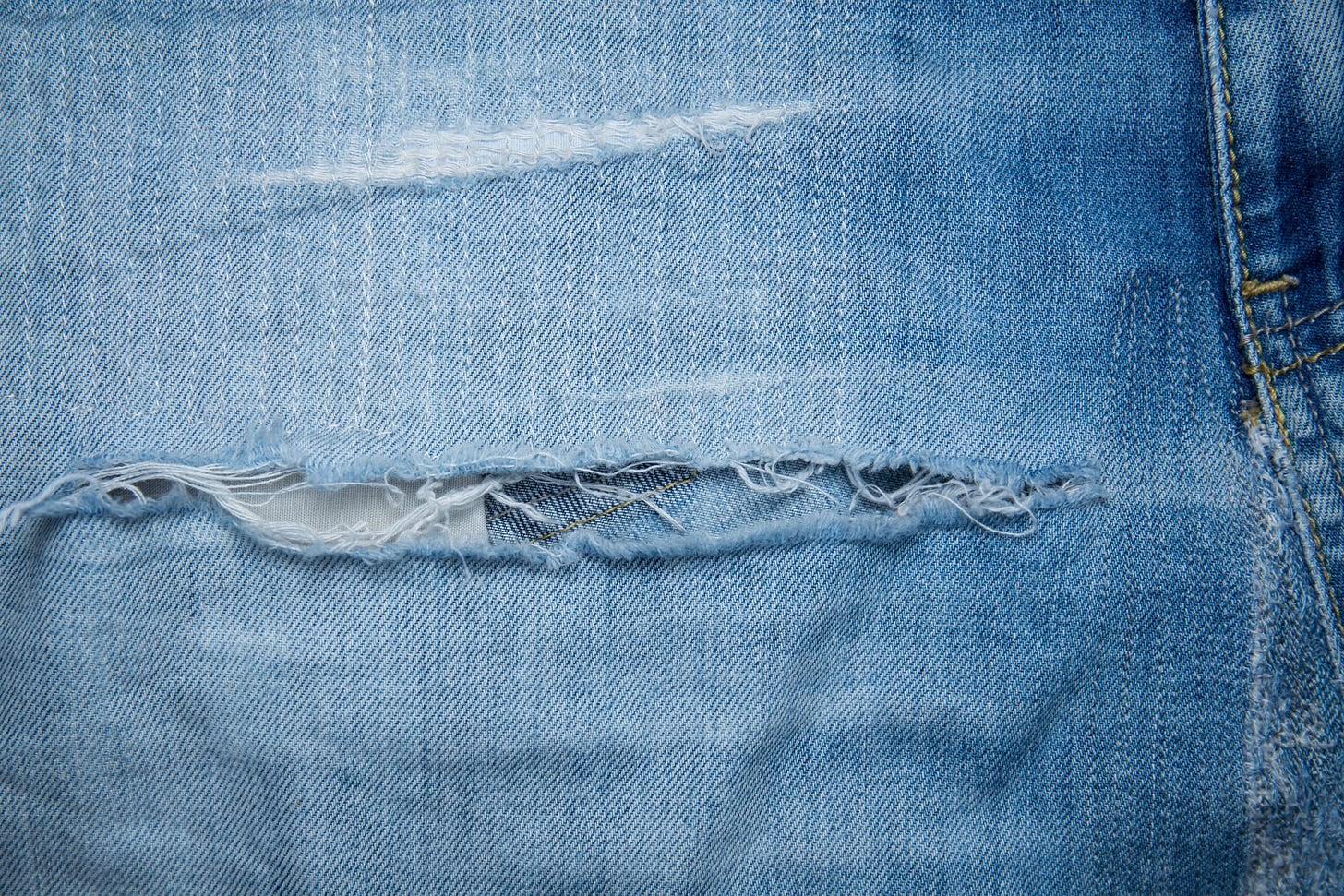I wore an "I Cry at Work" shirt to SXSW
Also: readers share intimate COVID-19 stories, Beck's loss-y vibes, and we're a Substack bestseller 💙
SXSW is a weird and fun thing. Frankly, I kind of always dread it.
The entire week is an ongoing struggle with the paradox of choice regarding the endless screenings, concerts, keynotes, activations, and people from LA wearing “I’m in Austin” outfits (you’ve had a rough winter, I adore you all). Time loses meaning, night becomes day, dogs and cats living together, mass hysteria…wait, sorry. That’s Ghostbusters. But anyway, it’s a lot.
This year, I purposely made few plans and surrendered to the spontaneity of connections with people who happened to be in front of me at the moment. It worked well. Because on Monday, I put on my “I Cry at Work" t-shirt and headed into the fray. First, because I cry at work sometimes. I’m in the grief and wellness space, for Pete's sake. Second, because all of you cry at work too. Sometimes, you just need to see someone wearing this shirt to feel comfortable openly admitting to it.
I got fist bumps, shouted me toos, and even free frozen chocolate-covered raspberries. Most of all, I heard hard stories—from the Netflix-branded pedicab dude who moved to Austin when work dried up, a security guard sharing his wife’s miscarriage, a woman in line for Dubai chocolate samples recalling her mom’s funeral, and many at loss-related events who identified me as a safe fellow feeler.
The world's humans are carrying around billions of hard experiences. Issuing an invitation to share them is one of the best gifts we can give – both to them and ourselves. You can nearly see the weight lifting from their shoulders as they realize someone else is willing to pull some of the load alongside them. Try it.
In a complicated world, I’m grateful for a week of nonstop external inspiration. Here are my favorite grief and wellbeing experiences from deep in Austin. I hope they’ll inspire you, too:
– Being invited to speak about how we can get better at broaching the topic of grief of all kinds at The Riveter’s evening feting AARP Chief Public Policy Officer Debra Whitman’s new book, The Second Fifty: Answers to the 7 Big Questions of Midlife and Beyond, which you can get here.
– An invite to the world premiere of Steven Feinartz’s documentary Are We Good?, about how WTF podcast host and comedian Marc Maron’s life changed after his longtime collaborator and girlfriend, Lynn Shelton, died in early 2020. I loved it, miss Lynn for Marc, and hope HBO snaps it up. If you haven’t seen From Bleak to Dark on HBO, also directed by Steven, you’ll nod into oblivion. Because you can do a lot more with funny than you can with sad. Here’s a clip.
– Cheryl Miller Houser’s keynote to 1700 on the power of using our vulnerabilities to create impactful human-centered storytelling. Just wow. Listen to it here.
– Morra Aarons-Mele’s pitch-perfect keynote on embracing our nuanced selves, loving our tricky brains, and unlocking our leadership gifts.
- Alok’s brave show at The Paramount, with its strong undercurrent of how they have spent their entire life basically auditioning for their own humanity. They are all the things/shades – poet, comedian, challenger, playful, intense. I’m grateful for their beautiful trans existence and insistence that you witness their whole being, from hairy chest to dangling earrings to short tight dress hugging their “wait…what is it?” parts.
– Cheering on Experience Camps For Grieving Children (which had me as its gala honoree a few years ago) at their panel and private fundraiser.
What I’m reading
🏠 “My Landlord Died From Cancer While We Sheltered In Place Together”: Faith Holloway, in her 20s, thought living with her 50-something landlord in South London would be simple—until the pandemic left them isolated. Even after her landlord died in their shared home, Faith remained cut off. Read it here.
🃏 The Feely Cards: My pal Nōn’s deck of cards guides users of all ages into embracing their empathy, developing vulnerability, and becoming more emotionally curious. Get them here.
📕 “Michelle Zauner’s Success Nearly Destroyed Her And then the Crying in H Mart film fell apart. But she’s changing her fortune with a new album.” As a fellow native Philly girl and unmothered daughter, I’m always cheering her on (and excited to catch Japanese Breakfast on tour). Read it here.
👗 My Wedding Gown’s Last Dance: Lucy Kalanithi, the widow of When Breath Becomes Air memoirist Paul Kalanithi, bids farewell to her bridal gown in an unexpected setting and with a cooler of King Cobra. Read it here. (Her twin, Joanna Goddard of Cup of Jo, has a Q&A with Lucy on Big Salad surrounding the 10th anniversary of Paul’s death.)
This week’s song-for-thought
Sharing music brings me joy, so I’m doing it more. This week: Beck’s soulful meditation on solitude and connection. Plus, I just love the guy. Caught his dreamy Tanglewood show with the Boston Pops last summer and he’s still got it. Close your eyes, breathe, and listen.
Book me for Mental Health Awareness Month
Does your organization value empathy and connection—corporate, non-profit, religious, or academic? Interested in helping employees navigate grief and loss of all kinds at work and beyond?
Book me for Mental Health Awareness Month talks and workshops in May, customized for your audience—managers, HR, ERGs, parenting, religious, grief communities, and more. Participants will gain connection to themselves and each other, practical tools, and a chance to laugh. Message or email me to learn more: rebecca@modernloss.com.
Modern Loss is a bestseller! Here are the reasons why you should become a paid subscriber.
This morning I got a nice email sandwiched in between all the emails from organizations warning me that the end is nigh with regard to democracy, climate change, and the last call sale at Saks. Modern Loss is a bestseller on Substack, and they even sent this handy little graphic to share with you.
Look, asking for money is probably my least favorite activity. But this work takes a lot of time — both mental and physical — and meaningful content and community is worth supporting.
And as it relates to you, well, the times, they are a-changin’. In the U.S., DEI initiatives and wellbeing programs are disappearing, Medicare is on shaky ground, and journalism is self-censoring. We’re worried about measles, tariffs, and dysentery like it’s the Oregon Trail—not 2025. Even essential words are being erased from federal websites (trauma, inclusion, mental health…women?!) Many of us don’t feel safe. This makes it even more crucial for entrepreneurial journalists and creators to step up. Since launching Modern Loss in 2013, I’ve worked to build community and amplify vital stories. Your support helps me keep going.
Please consider choosing to get 20% off an annual subscription. It will get you myriad benefits, including reading the rest of this issue.
What a long, strange trip Covid has been
Unless you’re living under not one but five large rocks, you are aware that we crossed the five year anniversary of the WHO declaring Covid-19 a global pandemic. I saw a meme yesterday about how the time jump from 2019 to 2025 needs to be studied and couldn’t agree more. Much like so many other profound losses, five years seems both like forever and a day.
My pandemic experience is only my own (and it contained a hell of a lot of trauma, poor decisions, and burnout alongside the shocking ability to keep going and even growing). So I collected raw and candid personal experiences from Modern Loss readers to show the enormous breadth of loss – and, most important, how we should be doing anything but referring to the pandemic in the past tense. Because the grief pandemic will well outlast the viral one.
To those who shared your stories, thank you. For more in-depth personal essays on the pandemic, go here.
What does pandemic grief personally mean to you?
Pandemic grief, to me, is layered, disorienting, and relentless. It’s grief without closure, loss without a proper goodbye. It’s the weight of mourning from a distance, the ache of knowing I couldn’t be there, couldn’t hold their hands, couldn’t whisper final words. It’s the isolation of it all—grieving alone while the world was collectively grieving, but in ways that still felt so deeply personal. It’s also the strange way memory fractures under trauma. Whole stretches of time are missing, blurred, or reshaped by the sheer stress of survival. Even now, I find myself questioning who is still here, scrolling through names and faces, unsure if I’m remembering correctly. Pandemic grief is more than just loss—it’s the ongoing disorientation of it, the way it rewired my sense of time, presence, and connection.
Fully re-entering the world causes me more grief than going into lockdown. I became so accustomed to solitude and the pace of working at home that return to the normal pace of life has been unsettling.
It means grief on top of the grief I was already experiencing after the loss of my partner to suicide in 2018. Grief layered on top. It means grief over relationships when they did not prioritize public health over vacations and gatherings. It means
Keep reading with a 7-day free trial
Subscribe to Modern Loss to keep reading this post and get 7 days of free access to the full post archives.

